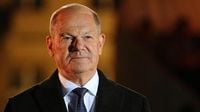Olaf Scholz, the outgoing Chancellor of Germany, was honored with a ceremonial farewell known as the Großen Zapfenstreich on the evening of May 5, 2025, at the Bendlerblock in Berlin. This traditional military ceremony marked the end of his nearly three and a half years in office, during which he navigated significant challenges including the COVID-19 pandemic and the ongoing war in Ukraine.
Scholz, visibly moved, expressed his gratitude during his farewell speech, highlighting the importance of civil discourse during political transitions. He stated, "It remains the honor of my life to have served Germany as Chancellor," emphasizing the need for unity in times of crisis.
As part of the ceremony, Scholz selected three songs that held personal significance. These included "In My Life" by The Beatles, an excerpt from Johann Sebastian Bach’s Second Brandenburg Concerto, and "Respect" by Otis Redding, famously covered by Aretha Franklin in 1967. The choice of these songs was seen as a reflection of his tenure and a subtle plea for recognition of his contributions.
During the event, the Stabsmusikkorps performed Scholz's song choices, with the rendition of "Respect" particularly energizing the crowd. Observers noted that Scholz appeared contemplative during the performances, with some suggesting he might have shed a tear as emotions ran high.
Scholz's predecessors also had their own memorable farewells. Angela Merkel, for example, chose the ecumenical hymn "Großer Gott, wir loben Dich" and Nina Hagen's hit "Du hast den Farbfilm vergessen" for her Großen Zapfenstreich. Gerhard Schröder’s farewell included classic songs like "My Way" by Frank Sinatra and "Summertime" by George Gershwin, showcasing the personal touch that each leader brought to their send-off.
Notably, the Großen Zapfenstreich is a ceremonial honor not limited to Chancellors; it is also awarded to Presidents and Defense Ministers in Germany. The tradition dates back to the early 19th century and has evolved to include prayers and songs that resonate with the values of the nation.
In his speech, Scholz reflected on the challenges Germany has faced, including the pandemic and the refugee crisis stemming from the war in Ukraine. He underscored the need for the nation to modernize and adapt, acknowledging that despite criticisms, Germany remains a global friend and ally.
His successor, Friedrich Merz, was present at the ceremony but faced criticism for his demeanor during the event. Social media users pointed out his seemingly disinterested posture, with one remarking, "This is going to be our new Chancellor? He doesn’t even have the decency to sit up straight for his predecessor’s farewell." Such comments reflect the heightened scrutiny public figures face, especially during significant events.
Merz, who will take over as Chancellor, was noted to have received a tidy office, as mentioned by government spokesperson Steffen Hebestreit. Scholz's administration had packed up in anticipation of the transition, aiming for a smooth handover.
The ceremony itself was attended by approximately 750 guests, including prominent political figures such as Defense Minister Boris Pistorius, who praised Scholz for his leadership during turbulent times. Pistorius remarked, "You were a Chancellor in stormy, difficult times, making decisions that were not always popular but necessary for stability."
Scholz’s farewell was broadcasted live, with channels like ARD and Phoenix providing coverage that aimed to minimize commentary during the solemn moments of the ceremony. This decision was made in response to past viewer criticisms regarding excessive commentary during such important events.
As the ceremony drew to a close, the soldiers of the Wachbataillon performed the traditional prayer, "Ich bete an die Macht der Liebe," a hymn written by the 18th-century theologian Gerhard Tersteegen. This hymn has become a staple in military ceremonies, symbolizing peace and reflection.
In a poignant moment, as the national anthem played, Scholz, alongside his wife, was seen departing in his official vehicle, escorted by a convoy of military police. The emotional weight of the evening was palpable, as he left behind a legacy marked by both challenges and achievements.
Looking ahead, Scholz will cast his vote for Merz in the Bundestag on May 6, 2025, marking the official transition of power. This vote symbolizes not only the end of his tenure but also the continuation of democratic processes in Germany, which Scholz highlighted as a critical aspect of the nation’s identity.
As he steps into the next chapter of his life, Scholz’s farewell serves as a reminder of the importance of leadership, resilience, and the ongoing journey of a nation that continues to evolve in a complex global landscape.


